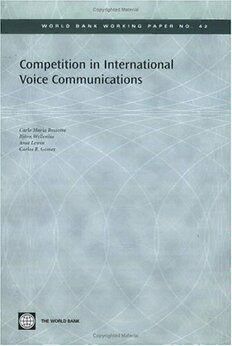
Competition in international voice communication PDF
56 Pages·2004·1.141 MB·English
Most books are stored in the elastic cloud where traffic is expensive. For this reason, we have a limit on daily download.
Preview Competition in international voice communication
Description:
"This title presents the case that opening international voice communication to competition is key to reform the telecommunications sector, is sustainable in developing countries, and results in major gains to consumers, businesses, and to the economy. Over the last 20 years full competition became a dominant attribute in virtually all high-income countries and in selected developing countries. Three forces were behind competition: globalization, technological change, and the emergence of international telecommunications as an enabler for integration and trade. Now over 80 percent of global voice traffic originates in fully competitive markets. Resistance to competition remains strong in several developing countries, even though countries such as Chile and El Salvador have demonstrated spectacular success in introducing and sustaining competition. A spectrum of reasons for resistance to competition exist. Some reasons are telecommunications-specific (lack of technical, regulatory and business skills, fear of bankrupting the incumbent operator). Other reasons are systemic, such as: (a) concern over fiscal losses, (b) lack of political influence by pressure groups favoring competition, (c) corruption, and (d) restrictions over information flows. Competition in international communications is also a matter of economic freedom. Competition in International Voice Communications makes a case for opening developing country markets quickly rather than gradually as well as identifies regulatory matters that need to be tackled in opening the markets to competition: regulatory reform, better licensing, interconnection and universal service regime."
See more
The list of books you might like
Most books are stored in the elastic cloud where traffic is expensive. For this reason, we have a limit on daily download.
